Personality matters and impacts
As stated in the OECD document “Personality matters: relevance and evaluation of personality characteristics” by Milos Kankaras in 2017 (1), personality characteristics shape human behavior and influence different and relevant areas of life. They do so not only through their direct effects on life achievements, but also through their indirect effects on other important personal factors such as the development of cognitive abilities, the achievement of educational qualifications, the creation of a family, work performance, social inclusion and the general well-being of individuals and societies as a whole.
In fact, there is evidence in a growing body of empirical research on the importance of personality characteristics for several important domains and life impacts (Roberts et al., 2007; Gutman and Schoon, 2013; Heckman and Kautz, 2012; Kautz et al, 2014).
In particular, these studies indicate that various personality attributes have a substantial influence on important areas of life, such as education. achievement, occupational status, productivity, job and life satisfaction, criminality, health and mortality.
In terms of education and training, personality matters. Different meta-analyses have shown that the Responsibility factor has a high impact on academic qualifications, which could be associated with “cognitive” skills.
Kankaras shows that among the eight key competencies listed in the European Framework for Lifelong Learning, (2) at least four refer mainly to personality traits and “non-cognitive” skills:
- Learning to learn (3): Key elements include self-discipline, perseverance and motivation.
- Social and civic skills (4) :Key elements include communication skills, tolerance, empathy and coping with stress.
- Sense of initiative and leadership. Entrepreneurship (5). Key elements include the ability to plan and manage projects, leadership skills, innovation, risk taking.
- Expression and cultural awareness. Creativity (6): Key elements include appreciation and understanding of diverse cultural forms of expression of ideas, experiences, and emotions.
In this paper, Kankaras reviews the scientific literature covering a wide range of personality characteristics, discussing their conceptualizations and main features, their relevance to important life and work outcomes, and the main ways in which they are measured.
(3) «Learning to learn” is the ability to initiate and persist in learning, to organize your own learning and to manage time and information effectively, either individually or in groups. This competence involves being aware of one’s own learning process and learning needs, determining available opportunities, and being able to overcome obstacles in order to complete learning successfully. Such competence means acquiring, processing and assimilating new knowledge and skills, as well as seeking guidance and making use of it. Learning to learn” means that learners build on previous life and learning experiences in order to use and apply new knowledge and skills in a variety of contexts, including private and professional life and education and training. Motivation and confidence are crucial for the acquisition of this competence.
(5) “Sense of initiative and entrepreneurial spirit” means the ability of the person to transform ideas into actions. It is related to creativity, innovation and risk taking, as well as the ability to plan and manage projects to achieve objectives. This competence supports all people, not only in their daily life, at home and in society, but also in the workplace, by being aware of the context in which their work is carried out and being able to take advantage of opportunities. It is the foundation for other more specific skills and knowledge required by people who establish or contribute to a social or commercial activity. This should include an awareness of ethical values and promote good governance”.
(6) “Appreciation of the importance of the creative expression of ideas, experiences and emotions through various media, including music, the performing arts, literature and the visual arts”



